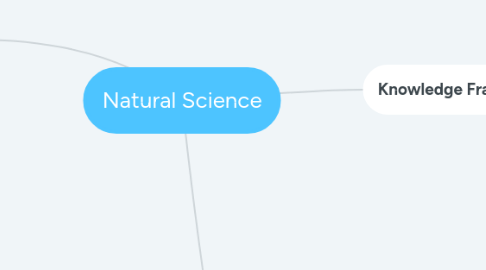
1. WOKs
1.1. Reason
1.1.1. Scientific inquiry is driven by reason. The observed natural phenomena are researched, and reasoning is used to validate hypotheses.
1.2. Intuition
1.2.1. Occasionally, science is based on a 'gut feeling' or the intuition of a scientist. This intuition leads scientists to inquire further and investigate more deeply.
1.3. Imagination
1.3.1. Scientists must be able to imagine the world in different scales- for example, imagining at the subatomic level or the stretches of outer space- to investigate further into the natural world.
1.4. Sense Perception
1.4.1. Scientific inquiry is based around naturally observed phenomena. In order to carry out any scientific investigation, there must be an observation made through sense perception.
2. Knowledge Framework
2.1. Scope
2.1.1. Natural sciences focuses upon knowledge from the natural world mostly based on sense perception and connected by reason and imagination
2.1.2. Knowledge is shared across the globe regardless of culture
2.1.3. Hypotheses are important, but understanding is too
2.1.4. Produce general scientific statements, principles, or laws about the natural world
2.1.5. Most laws are cause-effect (A → B)
2.2. Concept/Language
2.2.1. Precise language is used to reduce ambiguity, which might affect reasoning
2.3. Historical Development
2.3.1. Several paradigm shifts happened as natural sciences continued to develop
2.4. Methodology
2.4.1. To measure, we must interact with a certain aspect of the world, but this interaction could cause it to change
2.4.2. Models are important
2.4.3. Classification is the basis for natural sciences
2.4.4. Methods employed by natural sciences
2.4.5. Hypothesis: Deductive and inductive reasoning
2.4.6. Sense perception
2.5. Links to Personal Knowledge
2.5.1. Natural sciences helps us think of ourselves as ‘objects’ that abide by the laws of the universe
2.5.2. Little room to see ourselves as reasonable, free agents with wants and choice
2.5.3. Individuals have made revolutionary contributions
2.5.4. Use of imagination, intuition, and emotion in making hypotheses
3. Knowledge Question
3.1. To what extent is reason more influential than intuition in developing the process of scientific inquiry?
3.1.1. AOK: Natural Science
3.1.2. WOKs: Intuition, Reason
3.1.3. TOK Vocabulary: To what Extent, Scientific Inquiry
3.1.4. Claim: Reason is more influential than intuition: Pasteur's Swan Necked Flask Experiment
3.1.4.1. Pasteur's Swan Necked Flask Experiment is an experimental procedure aimed to disprove the Spontaneous Generation Theory. This theory stated that living organisms arose from dead organisms. Pasteur thought that there must be a scientific reason behind bacterial growth
3.1.5. Counterclaim: Intuition is more influential than reason: Edward Jenner's Smallpox Vaccine
3.1.5.1. Edward Jenner was an English doctor from Gloucestershire. At the time, smallpox was taking away the lives of several people. While a student, he noticed that milkmaids who contracted cowpox (which causes blisters on a cow’s udders) did not contract smallpox.This was purely intuition. Jenner did not have any empirical evidence to support his thoughts. It may have been possible that the milkmaids were never exposed to the smallpox virus.
